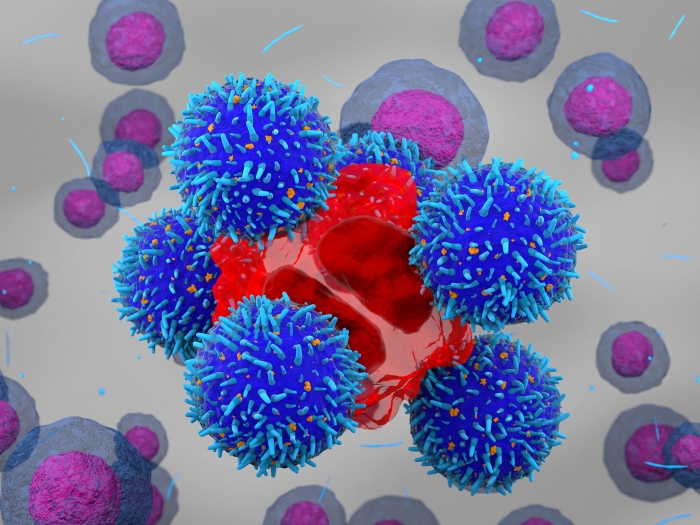Estrogen-lowering aromatase inhibitors are frequently prescribed to women with ovarian and uterine cancers. New research sheds light on how side effects impact these patients.
10:37 AM
Author |

Sharon Ritchie splits her time between Bloomfield, Michigan and Tucson, Arizona.
This lets the retired early childhood educator spend the colder months engaging in one of her favorite activities: golf.
Ritchie was diagnosed with stage IIIC low grade serous ovarian cancer in 2016 and successfully treated by doctors at the University of Michigan Rogel Cancer Center with surgery and six rounds of chemotherapy.
But the biggest impact on her quality of life were side effects from the medicine that she started taking to stop her body from producing estrogen — an important player in many gynecologic cancers.
"I have some joint pain from arthritis and some neuropathy from the chemo, but the letrozole made things really bad," she says. "My hands were quite swollen and there was a lot of pressure in my joints."
Joint and muscle pain are a common and often life-limiting side effect of letrozole and other medications in the same class, known as aromatase inhibitors. They can also cause hot flashes and fatigue.
These days, however, Ritchie is back on the links thanks to an innovative partnership at U-M that places specialists from the Michigan Medicine department of physical medicine and rehabilitation directly into the gynecologic oncology clinic.
The collaboration, which started in 2018 through the efforts of a Michigan Medicine ovarian cancer initiative, brings together a multidisciplinary team of doctors to treat a patient's cancer as well as manage any issues caused by the treatment itself — including neuropathy and medication side effects.
"I'm happily playing 18 holes of golf again," Ritchie reports. "I cannot say enough about the care I had at U-M."
Using research to improve patient care
This collaboration between U-M oncologists and rehabilitation specialists aims to help patients beyond just those seen at Michigan Medicine.
Earlier this year, a U-M team with diverse backgrounds in cancer treatment, physical rehabilitation and biostatics published some of the first research to examine aromatase inhibitor use, side effects and discontinuation rates in patients with gynecologic cancers.
They hope their findings will help gynecologic oncologists everywhere better understand and care for their patients.
The effort was driven by two medical residents — Sarah Bell, M.D., from the department of obstetrics and gynecology, and Brendan McNeish, M.D., from physical medicine and rehabilitation. They wanted to take some of the lessons learned about managing aromatase inhibitor side effects in breast cancer patients and apply them to those with gynecologic cancers.
But to do that, they needed a better understanding of the drugs' impact on this different patient population.
"Our big question was do our patients — gynecologic oncology patients — have a high rate of side effects from aromatase inhibitors? And if so, how often does it cause them to discontinue treatment?" says Bell, the study's first author. "That hadn't really been looked at before."
SEE ALSO: Keeping a Life-Limiting Side Effect from Threatening a Life-Saving Breast Cancer Treatment
The impact of aromatase inhibitors on patients with breast cancer has received much more attention. This is due, in part, to the fact that gynecologic cancers are more rare.
Additionally, the drugs are also often prescribed for different reasons. Aromatase inhibitors are frequently given to breast cancer patients to prevent estrogen-driven cancers from coming back — cutting their risk of recurrence in half. But in gynecologic cancers, they are more frequently prescribed as an active treatment for women whose cancer has already recurred, explains study senior author Karen McLean, M.D., Ph.D., a gynecologic oncologist.
Even though patients with gynecologic cancer still have a lot of side effects, they don't want to stop taking the medicine because they're worried about their cancer.
The U-M research, which included 146 women who received aromatase inhibitor therapy for ovarian or uterine cancer, found that more than half of the patients reported side effects from the medication.
Yet only 5% of gynecologic patients discontinued the treatment due to side effects — much lower than a discontinuation rate around 25% among breast cancer patients due to these musculoskeletal symptoms.
"Even though patients with gynecologic cancer still have a lot of side effects, they don't want to stop taking the medicine because they're worried about their cancer," McLean says. "Paradoxically, our study found that people with active cancer reported fewer side effects. That could be a combination of having a higher general level of pain and discomfort, but also it could be they don't want to report side effects because they're worried we'll take them off their medicine — for many of these patients, there aren't many other treatment options available."
Improving patients' quality of life
For the past two years — up until the COVID-19 pandemic necessitated some changes to clinic operations — U-M rehabilitation doctors saw cancer patients one day a week at the gynecologic oncology clinic.
"We surveyed our patients, and one of the things that came through very strongly was that while we provided cancer therapy really well, there was room to grow in some of our support services," McLean says. "So, we created a sort of one-stop-shop where patients could get access to additional rehabilitation services in the same place where they get their cancer care."
These types of combined clinics are increasing at cancer centers around the country, but are still relatively rare, especially for gynecologic cancers, says Cody Andrews, M.D., a Michigan Medicine rehabilitation physician who staffs the clinic and who worked with Ritchie to help manage her side effects.
In Ritchie's case, the drug duloxetine, an antidepressant and pain medication sold under the brand name Cymbalta, was able to greatly alleviate the joint pain caused by the aromatase inhibitor — enough to get her back out on the golf course. Gabapentin, an anticonvulsant and pain reliever, has also been effective in alleviating side effects for some patients, the researchers noted.
"We cooperatively see patients to assess and manage issues like pain, mobility, balance, driving, returning to work, bladder and bowel management, and sexual dysfunction — those side effects that often accompany cancer and its treatments," Andrews says. "These patients already spend so much time at the hospital seeing doctors, getting infusions, going for radiation that we try really hard here to decrease that burden as much as we can by co-locating care and approaching it in a team-based way."
Andrews and his peers evaluate patients and often prescribe physical or occupational therapy, as well as individual exercises to improve issues with things like core strength or balance.
They also do a lot of medication management and pain management — which can include pain from cancer surgery, nerve pain that is a frequent side effect of the chemotherapy agents used in gynecologic cancers, and, like in Ritchie's case, musculoskeletal pain caused by anti-cancer medications.
"The kind of muscle and joint pain that aromatase inhibitors can cause can be quite debilitating," Andrews says. "We want patients to know that this is something we can help manage, along with other symptoms they may be experiencing.
"As much as we can, we want to get people back to living their lives — because we know that restoring someone's normal day-to-day routine and making some basic improvements in their quality of life can have an amazing, positive reinforcing effect on their health and their overall treatment."
Related story: Keeping a Life-Limiting Side Effect from Threatening a Life-Saving Breast Cancer Treatment
Paper Cited: "Aromatase inhibitor use, side effects and discontinuation rates in gynecologic oncology patients," Gynecologic Oncology. DOI: 10.1016/j.ygyno.2020.08.015

Explore a variety of health care news & stories by visiting the Health Lab home page for more articles.

Department of Communication at Michigan Medicine
Want top health & research news weekly? Sign up for Health Lab’s newsletters today!





